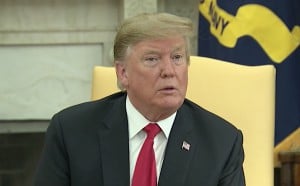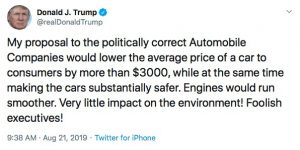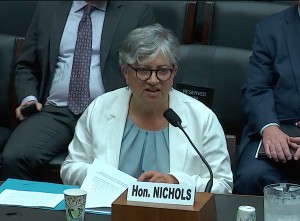
President Donald Trump criticized several automakers for making a deal with California for tougher fuel efficiency standards last month.
President Donald Trump took to Twitter to criticize four automakers for cutting a deal with California that flies in the face of the administration’s efforts to roll back Obama administration rules for fuel economy.
Ford Motor Co., Honda Motor Co., BMW AG and Volkswagen AG forged an agreement with California on fuel efficiency rules last month. The move not only stymies the administration’s move to lower fuel efficiency standards, but also its push to eliminate California’s ability to set its own standards.
The White House has urged other automakers not to back the California agreement, while Democrats have been calling and writing automakers urging them to sign on with California, Reuters reported. Trump took nearly a month to chide the automakers.
(Four Automakers Sidestep Trump, Make Fuel Economy Deal with CARB)
“My proposal to the politically correct Automobile Companies would lower the average price of a car to consumers by more than $3000, while at the same time making the cars substantially safer. Engines would run smoother. Very little impact on the environment! Foolish executives!” Trump tweeted.
Sierra Club Executive Director Michael Brune said Trump’s tweet was completely untrue. “Trump’s rollback is unraveling from every corner,” he said.
At the time the deal was announced, the National Highway Traffic Safety Administration offered a sedate responsein a statement saying the agency remains committed to its plans to ease fuel economy standards but noted that “every manufacturer is responsible for planning, designing and building as they find appropriate for their consumers, compliant with safety and other regulations.”
 However, the other half of the government agencies working on the new standards, the Environmental Protection Agency was more in line with Trump’s churlish tone Tuesday ridiculing the deal, calling it “nothing more than a press release.”
However, the other half of the government agencies working on the new standards, the Environmental Protection Agency was more in line with Trump’s churlish tone Tuesday ridiculing the deal, calling it “nothing more than a press release.”
Under the agreement with California, Ford, Honda, Volkswagen and BMW committed to improve their fleet averages by 3.7% each year, or slightly less than the standards set under the Obama administration.
After initially supporting the move, most automakers caught flack for it and reversed their position, Toyota and Honda being the major holdouts. Executives at both said at the time of the initial proposal they would be staying with the Obama-era mandate since they were already trending in that direction.
(Colorado Next State to Bypass Trump and Make Deal with Automakers)
Since then all major automakers have officially opposed the administration’s “preferred option,” freezing fuel economy requirements at 2020 levels through 2026.
Gloria Bergquist, a spokeswoman for the Alliance of Automobile Manufacturers, representing General Motors Co., Toyota Motor Corp., Ford, Volkswagen and others, said the companies “look forward to seeing a final rule soon. We support increases to standards that optimize all the priorities, including affordability so more Americans can buy a new car, plus preserving jobs and safety at the same time.”
The deal isn’t just important for California, whichis the country’s largest automotive market, but also due to the fact that 13 other states use California’s standards for their own mandates. Some of the states have also opposed the Trump administration plan.
In fact, just a week later, Colorado also reached a similar agreement with several automakers. General Motors, Volkswagen, Toyota and Hyundai agreed to terms on the program that starts with 2023 model-year vehicles. The deal permits automakers’ electric vehicle sales to earn them credits toward the overall goals.
Reuters reported that Trump’s tweet misstated some aspects of the administration’s proposal. Expected to be finalized by the end of next month, the proposal claims that by the 2030 model year, the average price increase of a new vehicle would be reduced by $1,850 and consumers would pay $490 less for financing, insurance and taxes.

CARB’s Mary Nichols disputed the Trump administration’s assertion the agency was unwilling to negotiate with federal officials.
However, there is nothing in the administration’s revisions that would result in engines running more smoothly, experts say. Additionally, Trump’s plan calls for a jump in U.S. oil consumption by about 500,000 barrels per day in the 2030s but reduce automakers’ collective regulatory costs by more than $300 billion. It would bar California from requiring automakers to sell a rising number of electric vehicles or setting state emissions rules.
The administration’s plan would cause the average global temperature to rise a small amount, but officials counter that thousands of lives would be saved because the lower price of vehicles would drive thousands to go out an buy newer, safer vehicles.
(Automakers Push Back on Trump Plans to Relax Mileage Rules)
The Obama-era rules adopted in 2012 called for a fleetwide fuel efficiency average of 46.7 miles per gallon by 2025, with average annual increases of about 5%, compared with 37 mpg by 2026 under the Trump administration’s preferred option.
